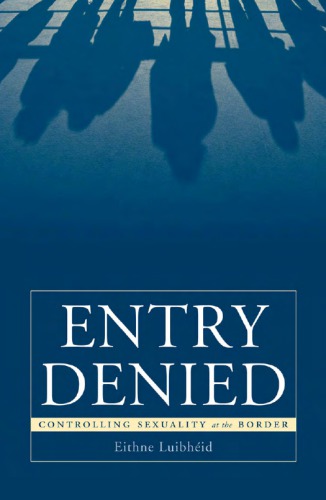Product desciption
Entry Denied Controlling Sexuality At The Border Eithne Luibhid by Eithne Luibhéid 9780816638031, 9780816638048, 9782002006068, 0816638039, 0816638047, 2002006067 instant download after payment.
A revelatory examination of 150 years of sexuality-based discrimination against immigrants to the United States.
Lesbians, prostitutes, women likely to have sex across racial lines, "brought to the United States for immoral purposes," or "arriving in a state of pregnancy"—national threats, one and all. Since the late nineteenth century, immigrant women’s sexuality has been viewed as a threat to national security, to be contained through strict border-monitoring practices. By scrutinizing this policy, its origins, and its application, Eithne Luibhéid shows how the U.S. border became a site not just for controlling female sexuality but also for contesting, constructing, and renegotiating sexual identity.
Initially targeting Chinese women, immigration control based on sexuality rapidly expanded to encompass every woman who sought entry to the United States. The particular cases Luibhéid examines-efforts to differentiate Chinese prostitutes from wives, the 1920s exclusion of Japanese wives to reduce the Japanese-American birthrate, the deportation of a Mexican woman on charges of lesbianism, the role of rape in mediating women’s border crossings today—challenge conventional accounts that attribute exclusion solely to prejudice or lack of information. This innovative work clearly links sexuality-based immigration exclusion to a dominant nationalism premised on sexual, gender, racial, and class hierarchies.
Reviews
Entry Denied combines the force of broad, sweeping narrative with the illuminating detail that comes from a careful exploration of specific cases. This is the first book that brings together the macrolevel analysis of immigration and sexuality in the United States and careful attention to the ‘microphysics’ of quotidian sexual policing along the country's borders.
—Roger Rouse, University of California, Davis
Entry Denied is compelling and timely. Luibhéid’s analysis of the legal construction of sexuality and gender from the vantage point of immigration creatively recasts and rearticulates the tangled web between the nation, race, sexuality, and gender.
—Martin.F. Manalansan, author of Cultural Compass: Ethnographic Explorations of Asian America
Luibhéid shows how immigration officials, armed with half-baked theories about the biological roots of lesbianism, tried to exclude potential immigrants on the basis of gender-inverted appearance. Entry Denied offers a useful corrective to studies of immigration policy that leave out sexuality, and scholarship on sexuality that fails to address how sexual practices and identities are embedded in systems of nation-building and immigration policy. Whatever one’s position in this debate, Luibhéid shows us that questions of sexuality have been, and will always be, key to understanding the meaning of nationhood.
—Contemporary Sociology
Since the late nineteenth century, immigrant women’s sexuality has been viewed as a threat to national security, to be contained through strict border-monitoring practices. By scrutinizing this policy, its origins, and applications, Eithne Luibhéid argues that the U.S. border became a site not just for controlling female sexuality but also for contesting, constructing, and renegotiating sexual identity.
—Hispanic Outlook
The book is well written and flows nicely.
—M2 Best Books
Entry Denied is a valuable addition to the scholarship on both immigration and sexuality. The author takes a social constructionist standpoint, rejecting scholarship that assumes that exclusion is usually based on ‘real,’ or concrete categories. A compelling analysis of how institutions construct boundaries.
—Journal of American Ethnic History


